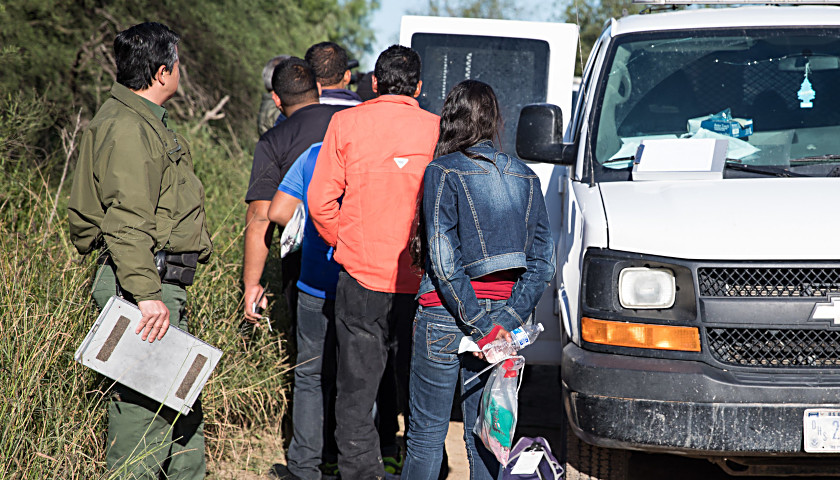by Bethany Blankley
More than 205,000 foreign nationals were apprehended or reported as gotaways after illegally entering the southwest border in February, according to preliminary data obtained by The Center Square from a U.S. Customs and Border Patrol agent. The agent provided the information on condition of anonymity for fear of retaliation; it only includes Border Patrol data and excludes Office of Field Operations data.
“Gotaways” refers to those known and reported to illegally enter the U.S. primarily between ports of entry, who intentionally evade capture by law enforcement and don’t return to Mexico.
In February, gotaways totaled at least 67,576, with the greatest numbers reported in the Tucson Sector of Arizona and El Paso Sector, which includes all of New Mexico and two west Texas counties. Apprehensions and gotaways combined totaled at least 205,032 last month.
In January, gotaways totaled nearly 60,000, with the greatest numbers reported in the El Paso and Del Rio sectors of Texas. Apprehensions and gotaways combined totaled at least 215,998 in January, according to the data.
Since President Biden’s been in office, monthly apprehensions of illegal foreign nationals surpassed a minimum of 150,000 for 23 consecutive months, with some months, including gotaways, like last November and December, totaling over 300,000 each.
According to preliminary Border Patrol data obtained by The Center Square, Texas continues to bear the brunt of illegal entries. But since late last year, cartel operations have driven crossings and illegal entries farther west, law enforcement officials have explained, backed by reported data. In February, the El Paso Sector had the most reported apprehensions and the Tucson Sector had the most reported gotaways. The Del Rio and RGV sectors, which have historically had the highest traffic, ranked third and fifth highest for traffic.
As of March 6, the preliminary data for February by sector includes:
Big Bend Sector
Apprehensions- 1,283
Turnbacks- 42
Gotaways Border Zone (known/recorded)- 944
Unclassifiable Detection- 0
Gotaways Interior Zone- 146
No Violations- 19
Deceased- 0
Outstanding- 14
Del Rio Sector
Apprehensions- 23,978
Turnbacks- 211
Gotaways Border Zone (known/recorded)- 11,648
Unclassifiable Detection- 65
Gotaways Interior Zone- 3,369
No Violations- 159
Deceased- 2
Outstanding- 52
El Centro Sector
Apprehensions- 4,554
Turnbacks- 272
Gotaways Border Zone (known/recorded)- 286
Unclassifiable Detection- 0
Gotaways Interior Zone- 11
No Violations- 1
Deceased- 0
Outstanding- 0
El Paso Sector
Apprehensions- 34,384
Turnbacks- 5,693
Gotaways Border Zone (known/recorded)- 16,837
Unclassifiable Detection- 36
Gotaways Interior Zone- 342
No Violations- 81
Deceased- 1
Outstanding- 22
Laredo Sector
Apprehensions- 4,345
Turnbacks- 2,370
Gotaways Border Zone (known/recorded)- 1,411
Unclassifiable Detection- 8
Gotaways Interior Zone- 558
No Violations- 176
Deceased- 5
Outstanding- 0
RGV Sector
Apprehensions- 15,632
Turnbacks- 2,785
Gotaways Border Zone (known/recorded)- 1,818
Unclassifiable Detection- 46
Gotaways Interior Zone- 954
No Violations- 91
Deceased- 6
Outstanding- 2
San Diego Sector
Apprehensions- 17,614
Turnbacks- 256
Gotaways Border Zone (known/recorded)- 5,271
Unclassifiable Detection- 4
Gotaways Interior Zone- 4,293
No Violations- 20
Deceased- 2
Outstanding- 7
Tucson Sector
Apprehensions- 25,371
Turnbacks- 638
Gotaways Border Zone (known/recorded)- 14,194
Unclassifiable Detection- 64
Gotaways Interior Zone- 4,409
No Violations- 241
Deceased- 3
Outstanding- 6
Yuma Sector
Apprehensions- 10,925
Turnbacks- 143
Gotaways Border Zone (known/recorded)- 956
Unclassifiable Detection- 0
Gotaways Interior Zone- 139
No Violations- 26
Deceased- 0
Outstanding- 0
Apprehensions refer to those who illegally entered the U.S. and surrendered or were caught by BP agents. Turnbacks refer to those who illegally entered but returned to Mexico.
Gotaways are reported two ways to show how many evade capture as they make their way north. The data reflects those identified illegally entering the country at the U.S.-Mexico border and farther north into the interior of the U.S. despite the best efforts of BP agents and local law enforcement officers attempting to apprehend them.
Unclassifiable detection (previously “unresolved detection”) isn’t part of the 6 U.S. Code, which classifies how encounters are to be reported. This, and the now-deleted category of “no arrests,” were used as a way to lower the number of gotaways being reported, the BP agent explains.
The previously deleted category of “no arrests” meant someone “was detected in a non-border zone and their presence didn’t affect Got-Away statistics,” according to the official internal tracking system definition used by agents to record data. “Unclassifiable detection” means the same thing, but the officers, for a range of reasons, couldn’t determine citizenship.
No-violations are “deemed to have committed no infraction and don’t affect Got-Away statistics,” according to the tracking system definition. The categories of no-violations, no arrests and unclassifiable detection should be categorized as got-aways, the BP officer said, assuming all non-arrests were of non-citizens. However, each sector also uses unclassified detection differently, the officer added, so how the numbers are categorized isn’t uniform.
If the categories of unclassified detection and no-violations were included with the gotaway numbers, the total number of gotaways for February would be closer to 68,613.
However, these numbers still don’t represent the real picture, those in law enforcement have explained to The Center Square, because they don’t include unknown and unrecorded gotaways. Not all gotaways are recorded because the agents and law enforcement officers on the ground don’t identify them all, meaning the number of those illegally entering the U.S. is expected to be much greater than is reported.
– – –
Bethany Blankley is a contributor to The Center Square.




